ISPOR Strategic Plan 2030
Prologue
ISPOR—The Professional Society for Health Economics and Outcomes Research (HEOR) is the largest and most influential organization in the world focused on the field of HEOR. Since 1995, the Society has advanced the science, policy, and practice of both health economics (the study of the behavior of individuals, healthcare providers, public and private organizations, and governments in decision making) and outcomes research (the evaluation of healthcare interventions on patient well-being, including clinical, economic, and patient-centered outcomes). During this time, the scope and sphere of influence of ISPOR has grown to comprise virtually every key stakeholder in the healthcare ecosystem, including health economists, outcomes researchers, academicians, health technology developers and assessors, regulators, industry leaders, healthcare policy makers, payers, providers, and crucially, patients. This multistakeholder perspective is foundational to ISPOR’s continuing ability to increase the understanding and application of HEOR to improve healthcare decisions. As a global resource of unbiased information and a catalyst for innovation in the HEOR field, the Society’s membership comprises more than 17,000 individual and chapter members from 100+ countries worldwide.

Our Vision
A world where healthcare is accessible, effective, efficient, and affordable for all

Our Mission
To advance health economics and outcomes research excellence to improve decision making for health globally

Our Values
Transformative | Scientific | Inclusive | Collaborative | Transparent | Ethical

ISPOR's Core Values
In all that ISPOR does, the Society is guided by a set of core values that underpin every decision and action. These values can be described as the deeply ingrained principles that guide our actions; they are ISPOR’s cultural cornerstones. Management scholars Jim Collins and Jerry Poras define core values as being inherent and sacrosanct; they can never be compromised, either for convenience or short-term economic gain.
"These values can be described as the deeply ingrained principles that guide our actions; they are ISPOR’s cultural cornerstones."
A Vision For the Road Ahead
As ISPOR emerged from the long shadow of the COVID-19 pandemic, new CEO Rob Abbott and President Brian O'Rourke felt the time was right to forge a new strategy for the Society. They both expressed a desire to see ISPOR leverage its experience and expertise in HEOR, as well as its global profile and reputation, to contribute meaningfully to the biggest challenges in healthcare:
1. Affordability and its impact on the long-term sustainability of healthcare systems
2. Digital Health and its influence on the transformation of healthcare
3. Whole Health and its potential to improve the wellbeing of people across the globe
It is critical that HEOR—and by association, ISPOR—anticipate the needs of a rapidly changing healthcare environment and position itself to ensure relevance and impact. In the face of increasing demands for healthcare globally combined with constrained resources to meet those demands, the importance of leveraging HEOR to inform healthcare decision making has never been greater.
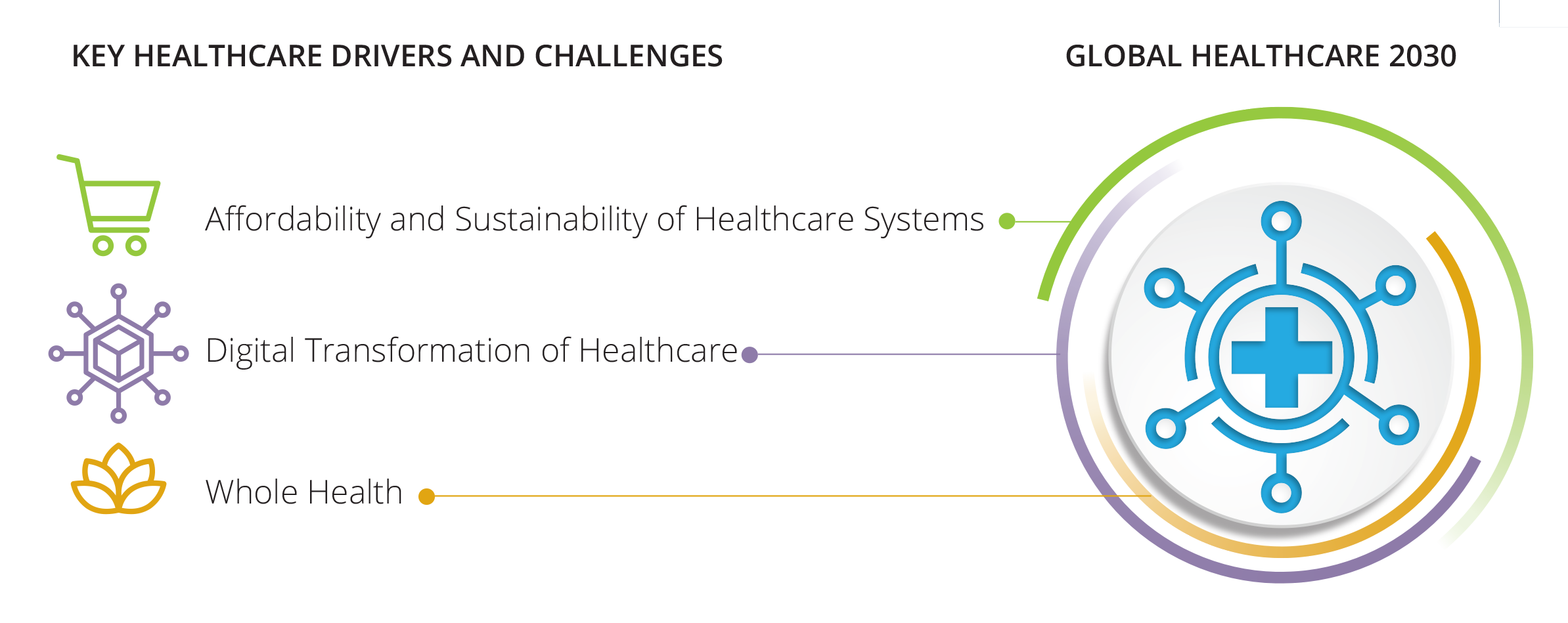
"In the face of increasing demands for healthcare globally combined with constrained resources to meet those demands, the importance of leveraging HEOR to inform healthcare decisions making has never been greater."
The Aspiration to Lead Global Change in Health Policy
An overarching aspiration in the strategy that emerged from deliberating on the past, present, and possible future of HEOR, and the major drivers of healthcare change, was to position ISPOR not merely as a respected organization but as the trusted global HEOR advisor leading change in health policy. To do so, it was necessary to consider where and how HEOR had “moved the needle” in the design and delivery of healthcare and equally, where it had not. The Society’s Health Science Policy Council therefore authored a visioning article that revealed several important findings:
1. HEOR information, while scientifically rigorous, was not consistently relevant or appropriate for healthcare policy or decision makers.
2. HEOR information that might otherwise be useful was not available at the time healthcare decisions were made.
3. The complexity of HEOR information was not seen to be transparent and therefore not trusted by decision makers and/or their constituents.
4. There is a lack of training in HEOR and its use at the decision-maker level.
5. There are structural conditions embedded within the healthcare ecosystem that are not conducive to the use of HEOR information.
Addressing the first 3 of these barriers requires better understanding and anticipation of the needs of specific decision makers— such as payers, physicians, and patients—and dedication to generating and tailoring HEOR evidence that is useful to them. In particular, greater attention to validation of decision-analytic models’ predictions of long-term outcomes using real-world data (RWD) could lead to greater credibility. Further, improved outreach and engagement might improve decision-maker confidence in the HEOR information they receive. Greater focus on the use of HEOR principles in health policy formation can help to reduce structural barriers. In short, the metaphorical “finish line” for much of the work that ISPOR has championed has moved. It is no longer sufficient to curate great science; it is equally necessary to translate that science into plain language and present it to decision makers in a way that enhances understanding and use. The new ISPOR Strategic Plan 2030 reflects this reality.
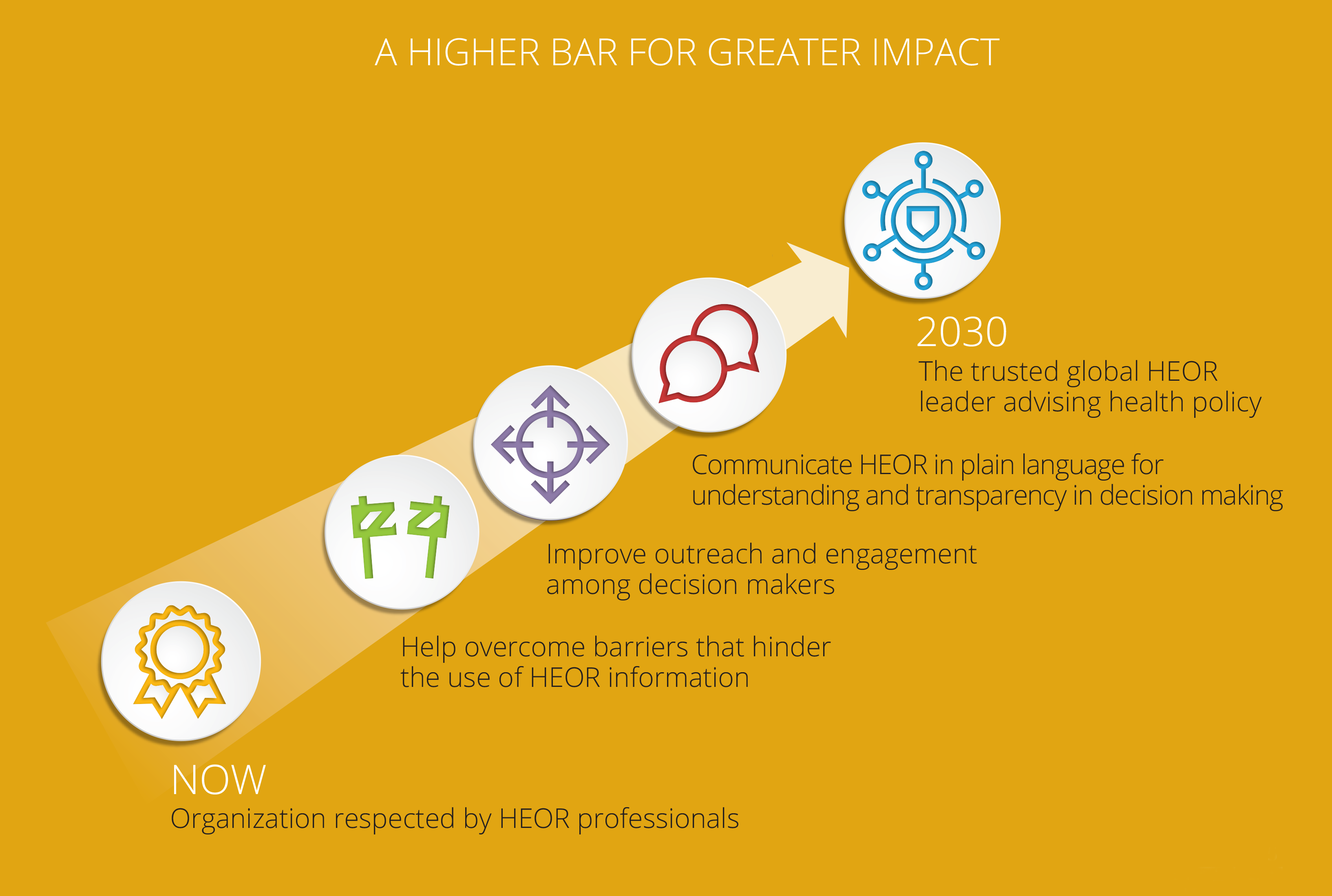
"It is no longer sufficient to curate great science; it is equally necessary to translate that science into plain language and present it to decision makers in a way that enhances understanding and use."
A Note on the Term "Value" in an HEOR Context
Health economists and outcomes researchers often use the term “value” to speak about the benefit that a given healthcare intervention, such as a new drug therapy, may bring to stakeholders. When the term value is used in an HEOR context, HEOR professionals do not intend to suggest the concept of “cheap” or “low cost” (as this term may indicate when used in consumer marketing, for example).
The term value, when used in an HEOR context, is intended to convey the concept of bringing the best that medicine has to offer, to the largest number of people, at reasonable cost. Value used in the field of HEOR connotes that a given medical intervention actually works and will make a positive difference in the lives of patients. Value means that the pricing of the health intervention—whatever it may be—does not create insurmountable barriers for patients and their families.

“The term VALUE, when used in an HEOR context, is intended to convey the concept of bringing the best that medicine has to offer, to the largest number of people, at reasonable cost."
ISPOR's Goals
To realize ISPOR’s new vision—a world where healthcare is accessible, effective, efficient, and affordable for all—two simple, clear goals have been set to guide the future course of the Society’s efforts. With healthcare systems around the world struggling under the weight of rising costs and increasingly complex choices for decision makers, achieving these goals and advancing HEOR has never been more important.
The first goal speaks to ISPOR’s desire to build on the strong foundation of scientific research excellence that has long defined ISPOR and to extend it in such a manner that we are, and are seen to be, the world leaders in the definition, measurement, and use of value to improve healthcare decision making.
The second goal speaks to ISPOR’s intention to not only curate scientific and research excellence but to translate that scientific work and package it in such a way that it is used to make a real difference in the lives of patients worldwide as they access their healthcare system.
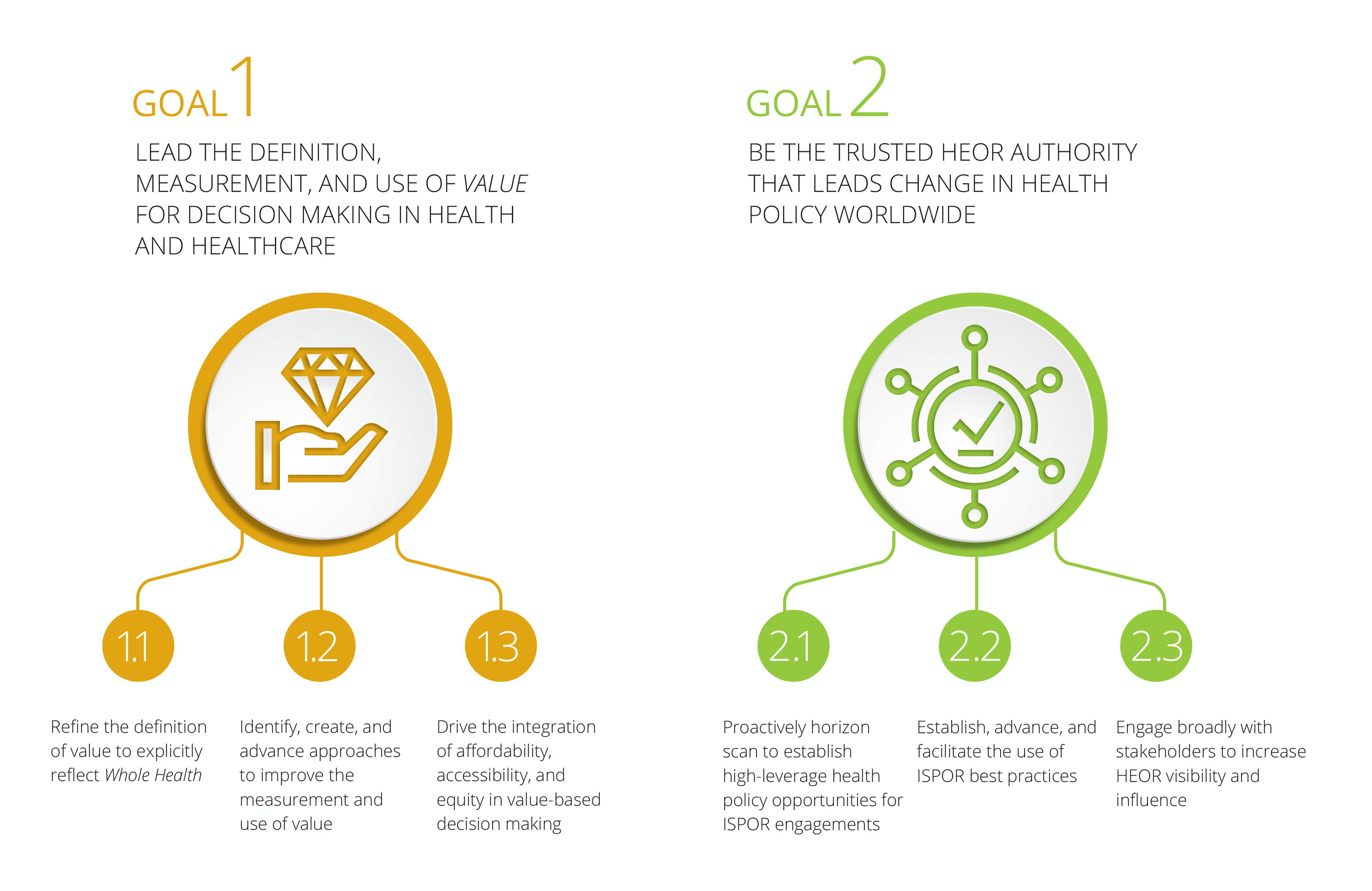
“With healthcare systems around the world struggling under the weight of rising costs and increasingly complex choices for decision makers, achieving these goals and advancing HEOR has never been more important."
Executing ISPOR's Goals and Objectives
ISPOR recognizes that it is no small feat to advance the Society’s mission and to work collaboratively toward the vision of a world where healthcare is accessible, effective, efficient, and affordable for all. Executing the Society’s goals and objectives requires resources and an operational structure. ISPOR’s organizational approach and foundational elements are designed to enable these goals and objectives. Four core foundational elements support this purpose.
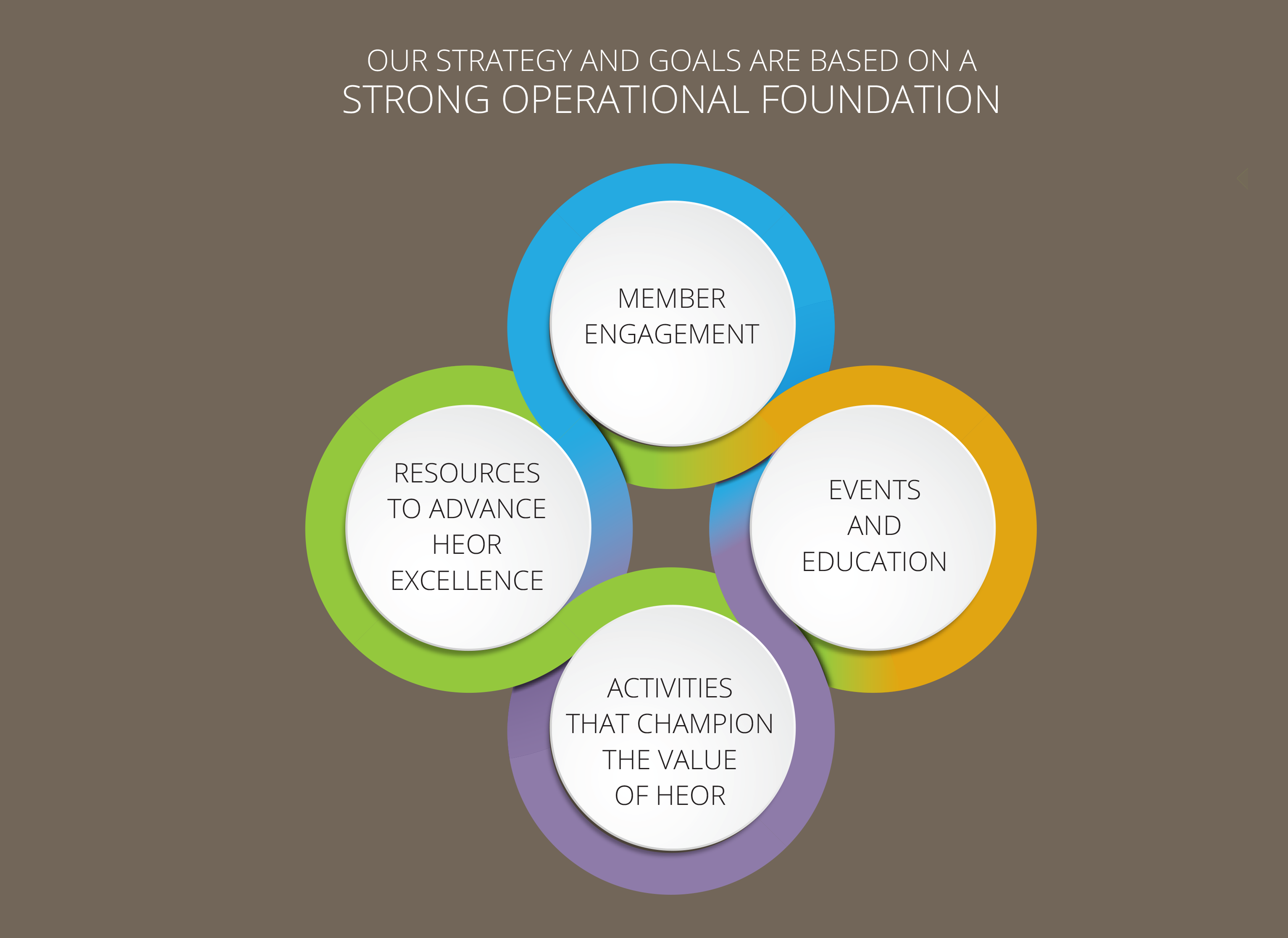
“ISPOR’s organizational approach and foundational elements are designed to enable these goals and objectives."
Multistakeholder Perspective
ISPOR's multistakeholder perspective is foundational to its continuing ability to increase the understanding and application of health economics and outcomes research (HEOR) to improve healthcare decisions.
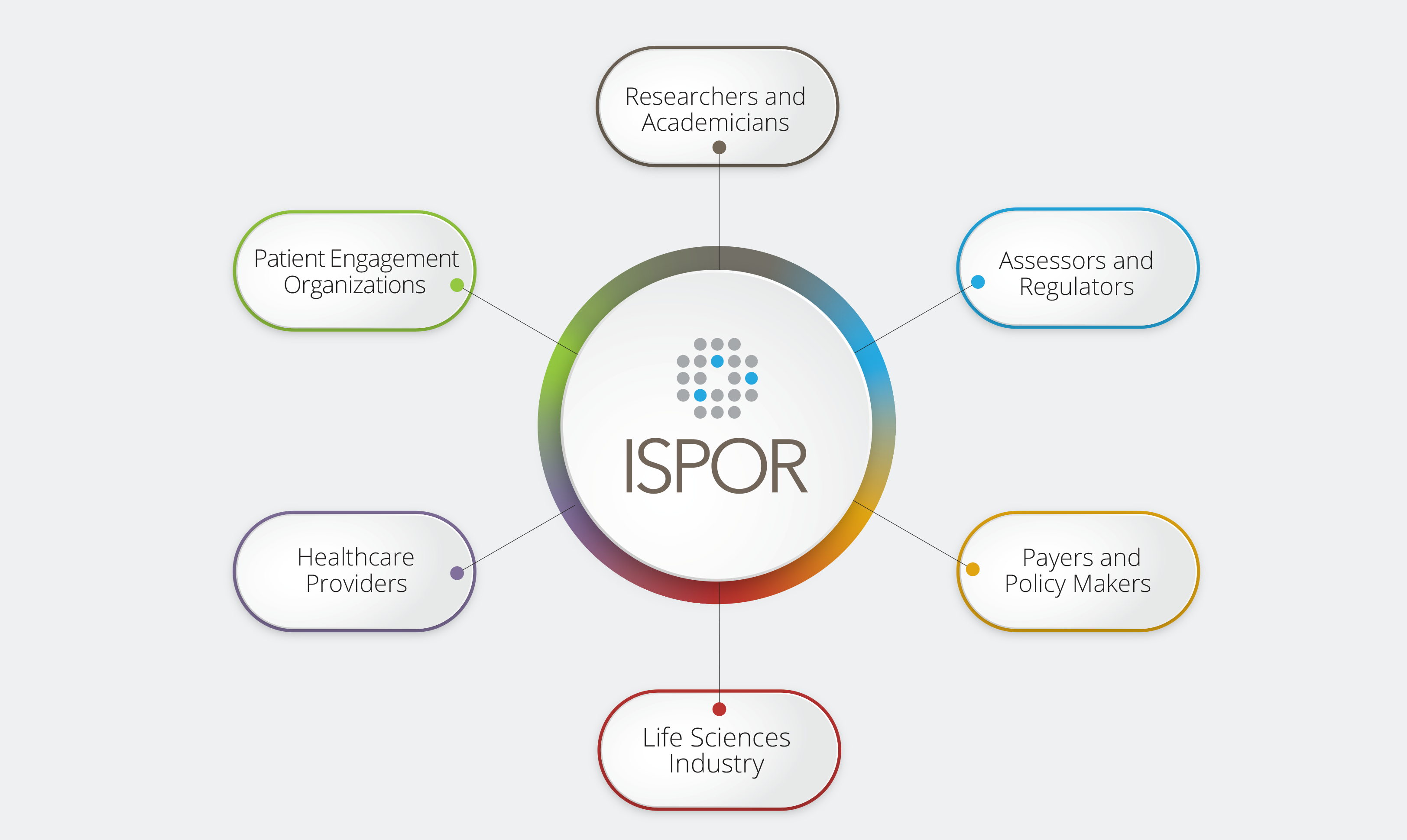
“ISPOR’s multistakeholder perspective is foundational to its continuing ability to increase the understanding and application of health economics and outcomes research to improve healthcare decisions."
Acknowledgements
ISPOR's Strategic Plan 2030 was developed through the input and guidance from many of the Society’s leaders, including its board of directors, past presidents, council and other member group leaders, past board members, and others. Their significant contributions were vital to the development of this plan.
It is important to note the crucial role of ISPOR’s 2023–2024 Board of Directors who directed the work on this initiative. Special thanks to Dr Brian O’Rourke, the Society’s 2023-2024 President, who led the development and finalization of the plan.
ISPOR 2023–2024 Board of Directors
2023-2024 President
Brian O’Rourke, PharmD, CD, OMM
Brian O’Rourke Health Care Consulting, Inc
2023-2024 Immediate Past President
Jan Elias Hansen, PhD
Genentech
2023-2024 President-Elect
Eberechukwu Onukwugha, PhD
University of Maryland
Director
Dalia Dawoud, PhD
The National Institute for Health and Care Excellence (NICE)
Director
Beth Devine, PhD
University of Washington
Director
Marlene Gyldmark, MPhil
Idorsia Pharmaceuticals, Ltd
Director
Andrea Manca, MSc, PhD
University of York
Director
Lucinda Orsini, DPM, MPH
COMPASS Pathways
Director
Amy O’Sullivan, PhD
Ontada
Director
Dong-Churl Suh, PhD
Chung-Ang University College of Pharmacy
Director
Sean D. Sullivan, BScPharm, MSc, PhD
University of Washington
CEO and Executive Director
Rob Abbott
ISPOR—The Professional Society for Health Economics and Outcomes Research
“ISPOR’s Strategic Plan 2030 was developed through the input and guidance from many of the Society’s leaders, including its board of directors, past presidents, council and other member group leaders, past board members, and others."


